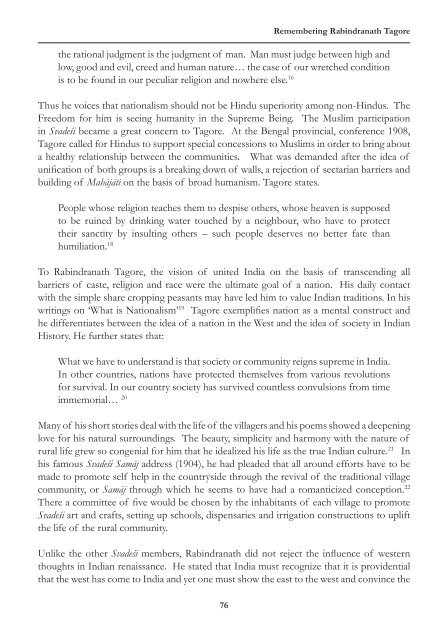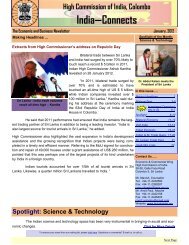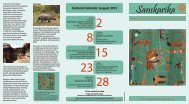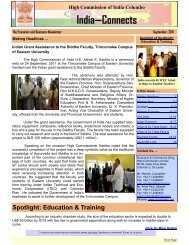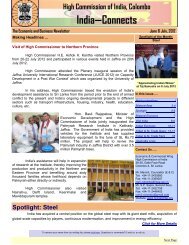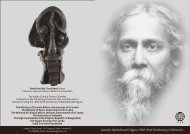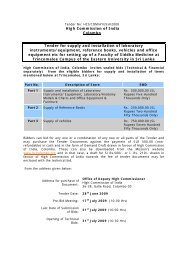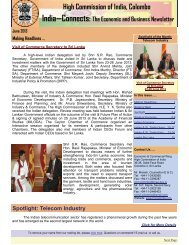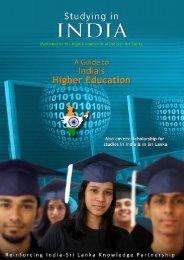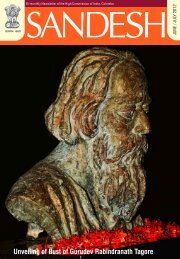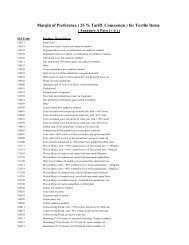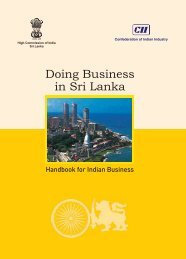Remembering Rabindranath Tagore Volume - High Commission of ...
Remembering Rabindranath Tagore Volume - High Commission of ...
Remembering Rabindranath Tagore Volume - High Commission of ...
Create successful ePaper yourself
Turn your PDF publications into a flip-book with our unique Google optimized e-Paper software.
76<br />
<strong>Remembering</strong> <strong>Rabindranath</strong> <strong>Tagore</strong><br />
the rational judgment is the judgment <strong>of</strong> man. Man must judge between high and<br />
low, good and evil, creed and human nature… the case <strong>of</strong> our wretched condition<br />
is to be found in our peculiar religion and nowhere else. 16<br />
Thus he voices that nationalism should not be Hindu superiority among non-Hindus. The<br />
Freedom for him is seeing humanity in the Supreme Being. The Muslim participation<br />
in Svadeśi became a great concern to <strong>Tagore</strong>. At the Bengal provincial, conference 1908,<br />
<strong>Tagore</strong> called for Hindus to support special concessions to Muslims in order to bring about<br />
a healthy relationship between the communities. What was demanded after the idea <strong>of</strong><br />
unification <strong>of</strong> both groups is a breaking down <strong>of</strong> walls, a rejection <strong>of</strong> sectarian barriers and<br />
building <strong>of</strong> Mahājāti on the basis <strong>of</strong> broad humanism. <strong>Tagore</strong> states.<br />
People whose religion teaches them to despise others, whose heaven is supposed<br />
to be ruined by drinking water touched by a neighbour, who have to protect<br />
their sanctity by insulting others – such people deserves no better fate than<br />
humiliation. 18<br />
To <strong>Rabindranath</strong> <strong>Tagore</strong>, the vision <strong>of</strong> united India on the basis <strong>of</strong> transcending all<br />
barriers <strong>of</strong> caste, religion and race were the ultimate goal <strong>of</strong> a nation. His daily contact<br />
with the simple share cropping peasants may have led him to value Indian traditions. In his<br />
writings on ‘What is Nationalism’ 19 <strong>Tagore</strong> exemplifies nation as a mental construct and<br />
he differentiates between the idea <strong>of</strong> a nation in the West and the idea <strong>of</strong> society in Indian<br />
History. He further states that:<br />
What we have to understand is that society or community reigns supreme in India.<br />
In other countries, nations have protected themselves from various revolutions<br />
for survival. In our country society has survived countless convulsions from time<br />
immemorial… 20<br />
Many <strong>of</strong> his short stories deal with the life <strong>of</strong> the villagers and his poems showed a deepening<br />
love for his natural surroundings. The beauty, simplicity and harmony with the nature <strong>of</strong><br />
rural life grew so congenial for him that he idealized his life as the true Indian culture. 21 In<br />
his famous Svadeśi Samāj address (1904), he had pleaded that all around efforts have to be<br />
made to promote self help in the countryside through the revival <strong>of</strong> the traditional village<br />
community, or Samāj through which he seems to have had a romanticized conception. 22<br />
There a committee <strong>of</strong> five would be chosen by the inhabitants <strong>of</strong> each village to promote<br />
Svadeśi art and crafts, setting up schools, dispensaries and irrigation constructions to uplift<br />
the life <strong>of</strong> the rural community.<br />
Unlike the other Svadeśi members, <strong>Rabindranath</strong> did not reject the influence <strong>of</strong> western<br />
thoughts in Indian renaissance. He stated that India must recognize that it is providential<br />
that the west has come to India and yet one must show the east to the west and convince the


